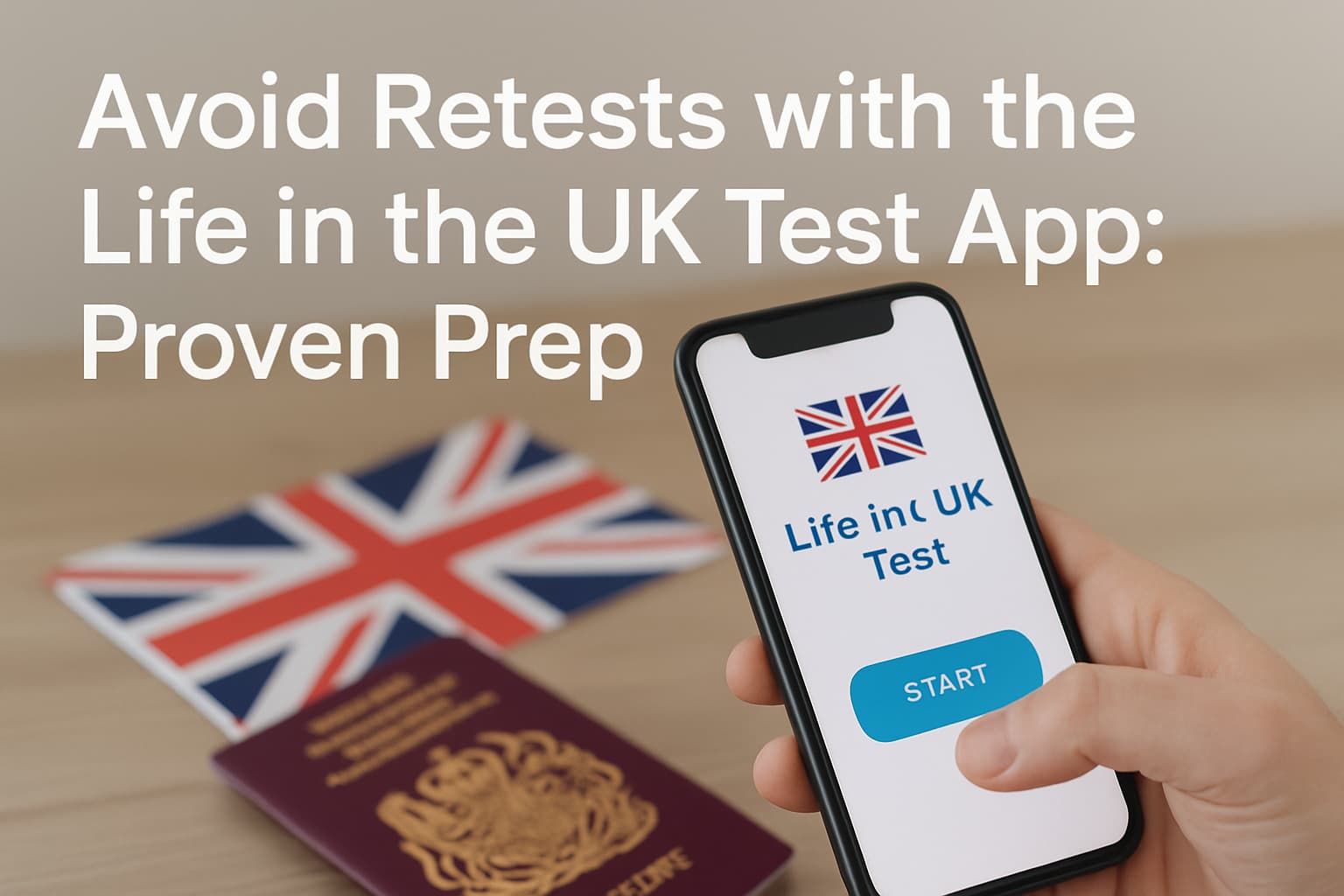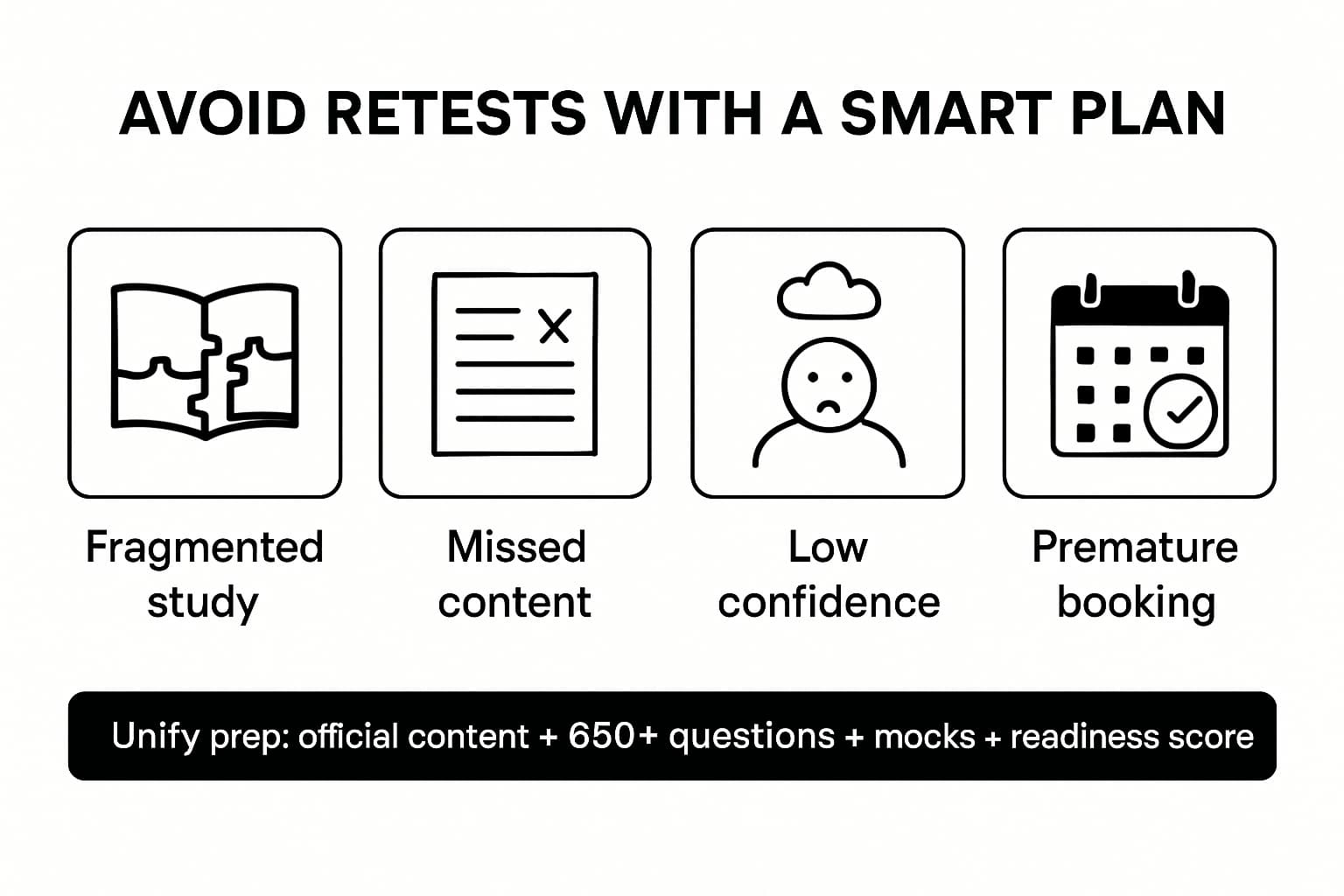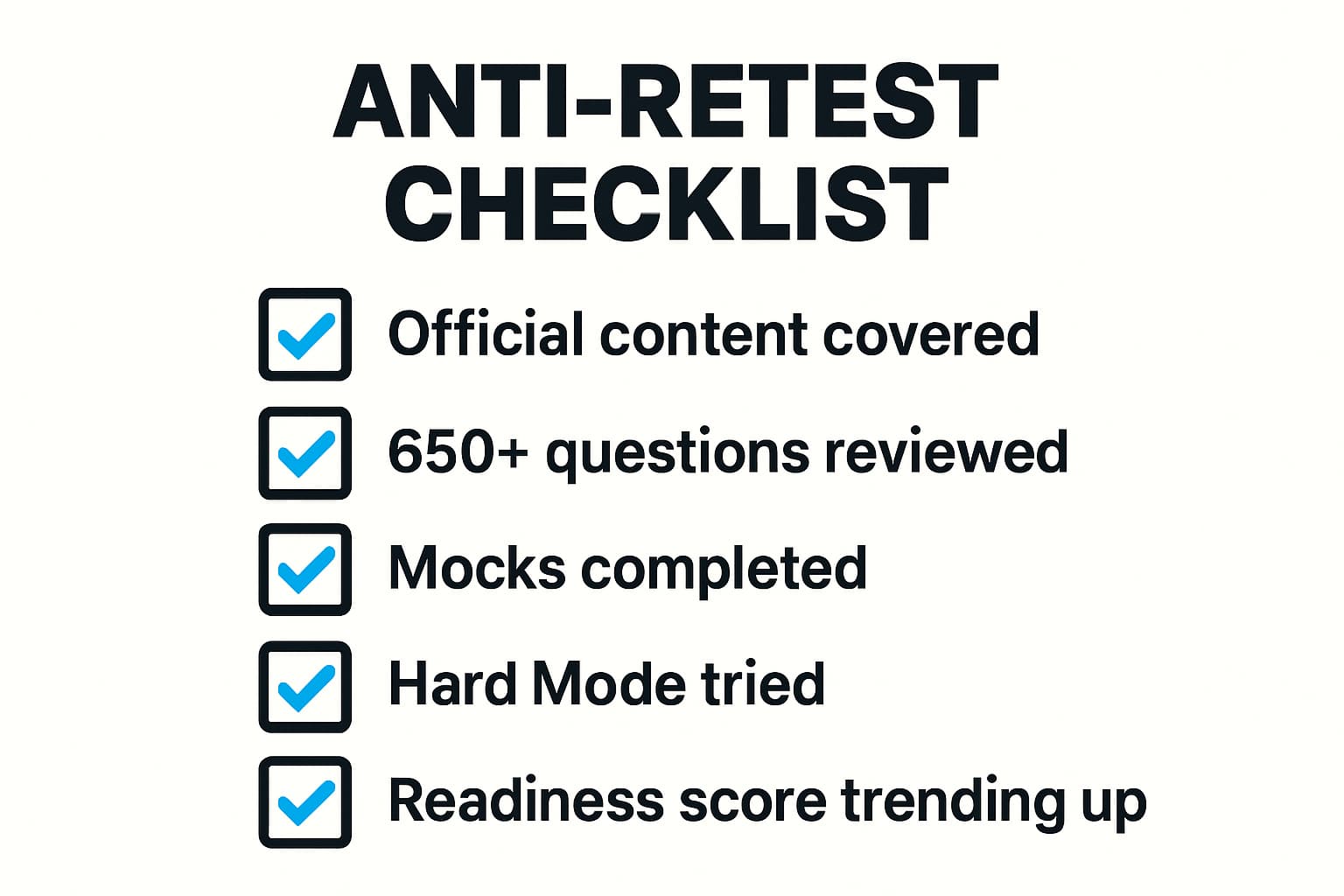Avoid Retests with the Life in the UK Test App: Proven Prep

Retests cost time, money, and momentum. The fastest way to avoid them is to prepare once, properly. This guide shows how the Life in the UK Test App turns scattered study into a proven, focused plan so you can sit your test with first-time confidence.
We will cover why retests happen, how to close every preparation gap using the app’s official handbook content, 650+ question bank with explanations, realistic mocks and Hard Mode, a readiness score you can trust, and offline study for consistency. Then use the anti-retest checklist and start smart.
Why Retests Happen—and How to Prevent Them
Most retests stem from two issues: incomplete content coverage and weak exam readiness. A single, integrated plan solves both. The Life in the UK Test App centralizes what matters—official handbook content, practice questions with explanations, mocks and Hard Mode, a readiness score, plus offline access—so nothing critical slips through.
The cost of fragmented study
Jumping between websites, PDFs, old notes, and random quizzes feels productive—until you discover missed topics on test day. Fragmented study is the main driver of low confidence and surprise questions because it makes it hard to ensure complete coverage and consistent practice.
| Fragmented study | Unified app prep |
|---|---|
| Unclear what you have actually covered | Complete official handbook content in one place |
| Random quizzes, no learning loop | 650+ questions with detailed explanations |
| Practice that does not reflect test pressure | Mock tests and a tougher Hard Mode |
| No reliable way to judge readiness | A readiness score to track progress and timing |
| Inconsistent study on busy days | Offline access for study anywhere |
The app advantage
When everything lives in one life in the uk test app, study becomes comprehensive and efficient:
- Complete official handbook content optimized for mobile learning
- 650+ question bank with detailed explanations
- Mock tests plus a challenging Hard Mode to stress-test knowledge
- Readiness score to gauge progress over time
- Offline access so you can study during commutes or breaks
- Brit-Bear, the smart learning assistant, to keep sessions focused
The goal: one seamless path from first read to confident booking—without the cost of a retest.

Related reading: Compare study formats in Life in the UK Test Web vs Apps: Cut Retakes, Save £££.
Cover Everything: Official Handbook Content in-App
Complete coverage starts with learning from the official handbook content inside the app. Studying in-app reduces the risk of outdated or partial material and keeps your core knowledge in one, mobile-friendly place.
Read with intention: build a foundation first, then reinforce with practice. You will feel the difference when explanations in the question bank refer back to sections you have just read.
Structured reading path
A structured path prevents omissions. Use the in-app handbook to move topic by topic in a logical order, taking short notes as you go. Keep sessions tight and focused so you are always moving forward. For a methodical plan, see Prepare for Life in the UK Test: Expert Method for First-Time Pass.
- Start with broad overviews, then dive into details
- Finish each topic with a short practice burst
- Return to tricky passages after reviewing explanations
Reinforce with explanations
Understanding accelerates when content and practice talk to each other. The app’s question explanations help you connect facts to context. Every time you miss a question, read the explanation and locate the related section in the in-app handbook. This is how mistakes become durable learning.
Turn Mistakes into Mastery: 650+ Question Bank
Practice is where knowledge becomes test-ready. The 650+ question bank provides the repetition and feedback you need, and the detailed explanations ensure you learn from each attempt rather than repeat errors later.
Identify weak areas quickly
Your practice performance is a signal. When you notice patterns in missed topics, flag them for targeted review. Alternate between reading the relevant handbook sections and reattempting related questions to check improvement.
- Note the topic of every incorrect answer
- Revisit the matching handbook section immediately
- Re-test with a fresh set of similar questions
Practice with purpose
Intentional sessions beat random quizzes. Set a micro-goal for each session (e.g., 15 questions on a single topic). Track improvement across attempts to ensure genuine progress before moving on.
- Choose one topic you find difficult
- Attempt a focused question set
- Read all explanations, even for correct answers
- Summarize the 1–2 key ideas you learned
- Repeat later the same day to confirm retention
Want a deeper practice blueprint? Explore Life in the UK Test Practice | Boost Your Success Today.
Quick install to start purposeful practice: Download on App Store or Get it on Google Play.
Proof Under Pressure: Mock Tests and ‘Hard Mode’
Confidence grows when you have faced realistic conditions. The app’s mock tests and tougher Hard Mode simulate exam pressure so you can learn to manage timing, question phrasing, and concentration dips.
Regular mock scheduling
Consistency turns nerves into familiarity. Try this simple, repeatable routine:
- Week 1–2: 1 mock per week to learn timing
- Week 3–4: 2 mocks per week to stabilize performance
- Week 5+: 2–3 mocks per week, interleaved with targeted review
Keep a short log after each mock: time remaining, 2 topics to review, and one thing you will do differently next time. Over a few weeks your confidence and speed will normalize.
Hard Mode for resilience
Real exams can feel tougher than expected. Practicing in Hard Mode builds resilience so even a tricky test feels manageable. Use it after you have stable mock scores; then mix regular and Hard Mode sessions to stretch your comfort zone without burning out.
For avoidable pitfalls many test-takers make, read 7 Common Life in the UK Test Mistakes to Avoid.
Track and Decide: Readiness Score
Definition: The app’s readiness score is a progress indicator that helps you decide when to move from learning to booking. Instead of guessing, you watch your score trend upwards across sessions and mocks.
Trend-based decisions
The trend matters more than any single session. Aim for a steady upward curve and stable mock performance. When your score plateaus at a comfortable level for several sessions, you are likely ready to book. For the booking steps and what to expect, see How to book the Life in the UK Test: step-by-step.
- Do not book on a one-off good day
- Do book when your score is stable and mocks feel routine
Use Brit-Bear for on-target sessions
Brit-Bear, the app’s smart learning assistant, helps keep your sessions focused so your time goes where it matters most. Follow its guidance to reduce wasted effort and sustain steady progress toward your target readiness score.
Study Anywhere to Stay Consistent
Busy weeks happen. With offline access, you can keep momentum even when your signal drops, you are underground, or you are traveling. Consistency is the antidote to last-minute cramming and the stress that leads to retests.
Micro-sessions during daily gaps
Turn small pockets of time into real progress:
- 5 minutes on a commute: 6–8 questions plus explanations
- 10 minutes at lunch: a quick read of one subtopic in the handbook
- 15 minutes in the evening: a mini mock or Hard Mode sprint
These micro-sessions add up. A handful per day can rival a long weekend study block—without the burnout.
Weekend catch-up without Wi-Fi
Going away or short on reliable internet? Keep your plan intact with offline access and return on Monday with your streak intact. If language is a barrier, consider local English classes; some local authorities can claim funding to support access to classes. See guidance noted by Local Government East of England on support for learning English.
Simple Anti-Retest Checklist
Use this quick checklist to confirm you are truly exam-ready. It aligns with the app’s core features and common retest risks.

- Official content covered: You have studied all relevant in-app handbook sections.
- Questions reviewed: You have worked through a substantial portion of the 650+ question bank and read the explanations.
- Mocks completed: You have finished multiple mock tests under timed conditions.
- Hard Mode tried: You have practiced with tougher sessions to build resilience.
- Readiness score trending up: Your trend is stable and consistent across recent sessions.
- Consistency achieved: You maintained study momentum using offline access when needed.
Content covered, questions reviewed
Before you book, confirm two things: you have read the in-app handbook thoroughly and you have turned explanations into understanding. If a topic still feels fuzzy, loop back—do not rely on luck.
Readiness score trend and mock comfort
You should feel calm and familiar with the test format in multiple mocks, not just one. Watch your readiness score over a week or two; if it holds steady while mocks feel controlled, you are in the right place.
Test-day reminder: Avoid non-academic causes of retests or lost fees. Per the official booking terms, arriving late or missing required ID can mean no refund. Review the Life in the UK test booking terms and conditions to ensure you bring documents and arrive on time.
Start Now—Avoid a Retest Later
Prepare once, pass with confidence. Install the Life in the UK Test App and follow the plan: learn the official content, practice with 650+ questions and explanations, prove it with mocks and Hard Mode, and watch your readiness score trend up.
One app. One plan. No retest.
FAQs
How does the app help me avoid a retest?
It consolidates official handbook content, 650+ questions with explanations, mocks and Hard Mode, a readiness score, and offline access into one plan.
What is Hard Mode?
Hard Mode is a tougher practice setting that builds resilience so the real exam feels more manageable after training under pressure.
When should I book my test?
When your readiness score trend is stable and your mock tests feel routine for at least several sessions. Avoid booking on a single good day.
Can I study without internet?
Yes. Offline access lets you read the official content and practice on the go so you do not lose momentum on busy days.
What if English is my biggest barrier?
Keep studying in-app and consider local English classes. Some local authorities note funding support for access to classes; check local guidance.
What should I remember on test day?
Arrive by the required time with the correct ID and documents. Missing these can mean no refund according to the official booking terms.